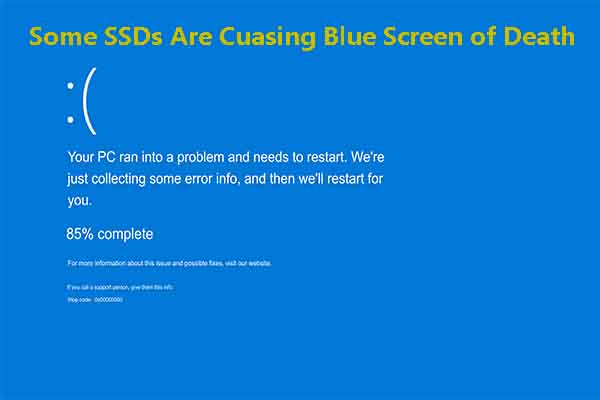This post focuses on the topic: can SSD overheat. To be specific, it reveals the results, causes, and fixes for the SSD overheating issue. If you are eager to know the answer, read this post now! MiniTool Partition Wizard tells you all the details.
To avoid data loss due to SSD overheating, you’d better use a piece of SSD cloning software to clone the drive periodically. MiniTool Partition Wizard is such an application that allows you to clone the entire hard drive within a few clicks. Besides, it can also be used as an SSD optimizer – to help you get the optimal performance of the SSD.
MiniTool Partition Wizard DemoClick to Download100%Clean & Safe
Also read: Cloning Hard Drive SSD Taking Forever? Find Causes and Solutions
Can SSD Overheat
Will SSD overheat? The answer is absolutely “Yes”. Actually, most of the commonly used SSDs in commercial and consumer applications are vulnerable to overheating. What does this mean? You should have an overall understanding of it to keep your drive and data safe.
This post shows you the effects, reasons, and fixes for SSD overheating.
Consequences and Causes of SSD Overheating
SSDs can work efficiently within a temperature range of 0ºC to 70ºC. With the latest Gen 5.0 SSDs, 80ºC to 85ºC is the new normal. How to know if the SSD is overheating? You can measure or monitor the temperature of the SSD by using programs like Open Hardware Monitor, Samsung Magician Software, etc.
You should observe the condition of your SSD regularly. Once the SSD gets overheating, you may experience the consequences below.
- The SSD overheating issue will drop the SSD performance and affect the SSD read/write speeds.
- An overheating SSD can result in byte corruption, which causes data loss.
- The system will slow down because of SSD overheating. To be specific, high SSD temperatures can cause the PC to start throttling.
- Due to SSD overheating, the drive will be deformed and physically damaged. Besides, the life and reliability of the SSD will be influenced.
As you see, SSD overheating has so many negative impacts. Hence, try your best to avoid or relieve SSD overheating. To do that, you should know what causes SSD overheating. The following are some factors that lead to SSD overheating.
- Excessive workload: SSD relies on continuous read and write processes, but overworking leads to elevated temperatures.
- Cooling system failure: An SSD will overheat due to the lack of cooling system, dust on the cooling system, poor ventilation, etc.
- High data density: More frequent crashes generate more heat.
- Drive failure: Bad sectors and physical damage can cause an SSD to fail immediately.
- Firmware issues: Outdated or corrupted firmware lets SSDs lose performance and power-saving features.
- Irregular power supply: Faulty components or poorly designed circuits can cause electrical issues.
How to Fix SSD Overheating
Based on the above possible reasons for SSD overheating, we propose the following fixes. You can try them to avoid or troubleshoot an overheating SSD.
Ensure that the SSD is well-ventilated: Don’t put the SSD near other heat sources like power supply units or heat sinks.
Don’t overuse the SSD: You will put pressure on the SSD when transferring large amounts of data simultaneously.
Install more fans: This can boost airflow and allow cool air to blow through the SSD.
Use an expertized cooler: A cooler can prevent SSD from overheating under heavy loads.
Keep the SSD firmware up to date: Updating the SSD firmware helps improve the SSD’s performance and reduce overheating.
Keep the SSD clean: When the SSD has dust buildup, the air won’t flow which results in SSD overheating.
Also read: SSD Endurance: Definition, Selection, Test, and Boost
Conclusion
Will SSD overheat? Are you still looking for the answer? If so, this post is what you need. It tells you everything.


User Comments :